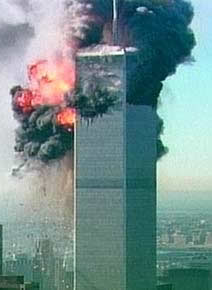 On
the morning of September 11, 2001, terrorists captured four American airplanes.
Suicide pilots guided two of the planes into the twin towers of New York
City’s World Trade Center, while another was guided into the Pentagon in
Washington, D.C. The Pentagon is the home of the American Department of
Defense, the government agency responsible for the American military. Reports
indicate that a group of passengers forced a fourth jet to crash in Pennsylvania.
The brave passengers apparently gave their lives to keep the terrorists
from harming any other innocent people. America had been unrivaled as a
military power since the breakup of the Soviet Union more than a decade
before the attacks. If America could be attacked, anyone, anywhere in the
world might be at risk. On
the morning of September 11, 2001, terrorists captured four American airplanes.
Suicide pilots guided two of the planes into the twin towers of New York
City’s World Trade Center, while another was guided into the Pentagon in
Washington, D.C. The Pentagon is the home of the American Department of
Defense, the government agency responsible for the American military. Reports
indicate that a group of passengers forced a fourth jet to crash in Pennsylvania.
The brave passengers apparently gave their lives to keep the terrorists
from harming any other innocent people. America had been unrivaled as a
military power since the breakup of the Soviet Union more than a decade
before the attacks. If America could be attacked, anyone, anywhere in the
world might be at risk.
What seems clear is that the attacks are rooted in the Middle East, an area of southwest Asia that includes Turkey, Iraq, Iran, Israel, Syria, and Afghanistan. The Greeks called the region the Near East to differentiate it from the Far East of China and Japan. England, France, and Germany came to be known as the West. The discovery of America added to the western world. The Middle East is often called "the crossroads of the world." This sparsely populated region produced three religious faiths practiced by half of the world inhabitants: Christianity, Islam, and Judaism. The Middle East is a gateway to India, the Far East, sub-Saharan Africa, and southeast Europe. In recent years, this region has been one of the most chaotic parts of our world. Many brilliant ideas came from the Middle East, but it is also a land of long standing hatred and revenge. This unit is an attempt to explain some of the causes of the many conflicts in the Middle East. |
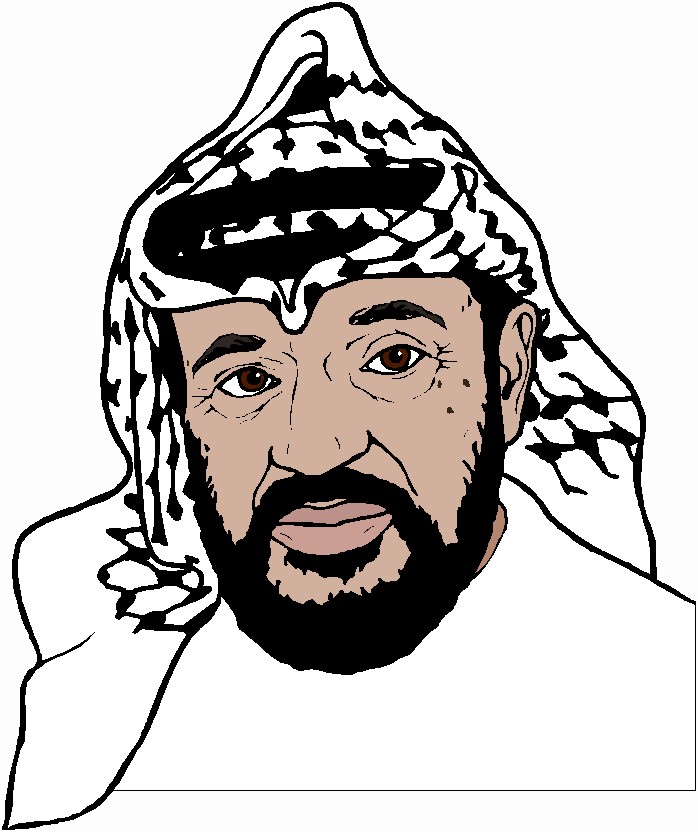 In
many western governments, particularly the United States, there is a separation
between religion and government. Many Muslims believe in Shariah,
a term that means "path" in Arabic. Shariah law tells devout Muslims what
to eat, how to pray, and how to behave in public. Muslims believe the Shariah
are revelations from God (Arabic Allah).
In
many western governments, particularly the United States, there is a separation
between religion and government. Many Muslims believe in Shariah,
a term that means "path" in Arabic. Shariah law tells devout Muslims what
to eat, how to pray, and how to behave in public. Muslims believe the Shariah
are revelations from God (Arabic Allah).
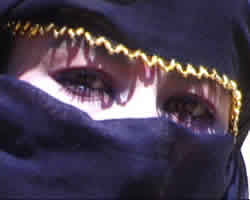 Saudi
Arabia is the only nation that closely adheres to Shariah law. Criminals
who commit murder, rape, or other violent crimes in Saudi Arabia face public
amputation of arms or legs, or beheadings. While Westerners treat morality
and behavior as an individual matter, the Saudis believe they are the responsibility
of the entire society. The result is a nation that is close to being crime
free. According to the Federal Bureau of Investigation (F.B.I.), there
were 15,517 murders and 90,186 forcible rapes in the United States in 2000,
while these crimes are almost unheard of in Saudi Arabia. Amnesty International
reports that Saudi Arabia executed about 766 criminals between 1990 and
1999. The United States, with about thirteen times the population of Saudi
Arabia, executed 85 prisoners in 2000 including 40 in Texas alone. Many
Americans live in gated communities with expensive security systems. It
is not uncommon to see American homeowners place bars over their windows.
Americans may feel Saudi justice is cruel, but they take for granted precautions
most Saudi people have never considered.
Saudi
Arabia is the only nation that closely adheres to Shariah law. Criminals
who commit murder, rape, or other violent crimes in Saudi Arabia face public
amputation of arms or legs, or beheadings. While Westerners treat morality
and behavior as an individual matter, the Saudis believe they are the responsibility
of the entire society. The result is a nation that is close to being crime
free. According to the Federal Bureau of Investigation (F.B.I.), there
were 15,517 murders and 90,186 forcible rapes in the United States in 2000,
while these crimes are almost unheard of in Saudi Arabia. Amnesty International
reports that Saudi Arabia executed about 766 criminals between 1990 and
1999. The United States, with about thirteen times the population of Saudi
Arabia, executed 85 prisoners in 2000 including 40 in Texas alone. Many
Americans live in gated communities with expensive security systems. It
is not uncommon to see American homeowners place bars over their windows.
Americans may feel Saudi justice is cruel, but they take for granted precautions
most Saudi people have never considered.
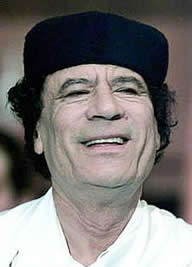 Moummar
al-Qadaffi has controlled Libya since leading a revolution in 1967. Qadaffi
has supported the destruction of Israel, and his supporters have been implicated
in several terrorist attacks. Libyan sponsored terrorists bombed a nightclub
in West Berlin, Germany, in 1986. Libyan agents have also been linked to
a mid-air bombing of an airplane over Scotland in 1988. Many western nations,
including the United States, have no diplomatic relations with Libya because
of their support of terrorism.
Moummar
al-Qadaffi has controlled Libya since leading a revolution in 1967. Qadaffi
has supported the destruction of Israel, and his supporters have been implicated
in several terrorist attacks. Libyan sponsored terrorists bombed a nightclub
in West Berlin, Germany, in 1986. Libyan agents have also been linked to
a mid-air bombing of an airplane over Scotland in 1988. Many western nations,
including the United States, have no diplomatic relations with Libya because
of their support of terrorism.
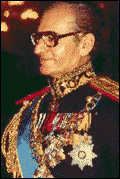 Shah
Reza Pahlavi ruled Iran until 1979. The Shah used his oil wealth to modernize
his nation, as Ataturk had done in Turkey. The Shah’s "White Revolution"
allowed women to vote and hold jobs, built big cities, and created a more
secular or non-religious society.
Shah
Reza Pahlavi ruled Iran until 1979. The Shah used his oil wealth to modernize
his nation, as Ataturk had done in Turkey. The Shah’s "White Revolution"
allowed women to vote and hold jobs, built big cities, and created a more
secular or non-religious society.
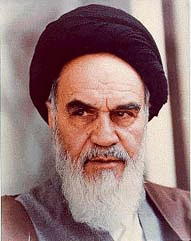 Iran
had been a very devout Muslim nation, and many Iranians were very unhappy
with the Shah’s changes. Further, many people close to the Shah were corrupt.
Anyone who disagreed with the Shah was forced to leave the nation or face
SAVAK, the Shah's brutal secret police force.
Iran
had been a very devout Muslim nation, and many Iranians were very unhappy
with the Shah’s changes. Further, many people close to the Shah were corrupt.
Anyone who disagreed with the Shah was forced to leave the nation or face
SAVAK, the Shah's brutal secret police force.
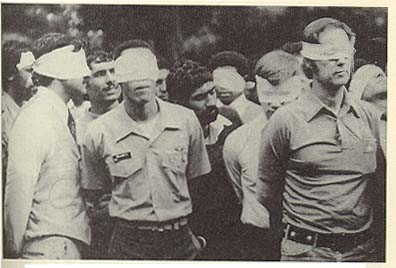 In
January 1979, the Iranian people revolted and forced the Shah to flee.
A popular religious leader, the Ayatollah Ruhollah Khomeini gained control
of the nation and created an Islamic republic. The Ayatollah denounced
the United States as the "Great Satan." Shortly after the United States
allowed the Shah to come to New York City for cancer treatment, Iranian
students stormed the American embassy and held 52 Americans hostage for
more than a year. Iran released the hostages in 1981, but tensions continue
to exist between the United States and Iran, two nations with very different
cultures.
In
January 1979, the Iranian people revolted and forced the Shah to flee.
A popular religious leader, the Ayatollah Ruhollah Khomeini gained control
of the nation and created an Islamic republic. The Ayatollah denounced
the United States as the "Great Satan." Shortly after the United States
allowed the Shah to come to New York City for cancer treatment, Iranian
students stormed the American embassy and held 52 Americans hostage for
more than a year. Iran released the hostages in 1981, but tensions continue
to exist between the United States and Iran, two nations with very different
cultures.
 Iraq
was once known as Babylon. Like Babylon’s Nebuchadnezzar, Iraq is led by
a dictator who has fought bloody wars with his neighbors. Saddam Hussein
has been the sole ruler of Iraq since 1979. A year later, he began a bloody
war with Iran. Iraq wanted to seize control of the oil rich land in Iran.
The two sides fought for nine years, and as many as one million people
died, but neither nation gained in the war.
Iraq
was once known as Babylon. Like Babylon’s Nebuchadnezzar, Iraq is led by
a dictator who has fought bloody wars with his neighbors. Saddam Hussein
has been the sole ruler of Iraq since 1979. A year later, he began a bloody
war with Iran. Iraq wanted to seize control of the oil rich land in Iran.
The two sides fought for nine years, and as many as one million people
died, but neither nation gained in the war.
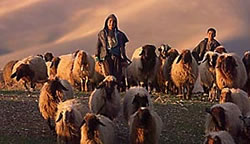 Seventeen
million Kurds are pastoral Muslims with a distinct language and culture.
Kurdistan, the land of the Kurds, is a mountainous region that is divided
among many countries. The Kurds make up about 18% of the population of
Turkey, 23% of Iraq, 10% of Iran, 8% of Syria, and smaller portions of
Georgia, Azerbaijan, Armenia, and Lebanon. The Kurds expected to
become an independent nation after World War I, but Turkish leader Kemal
Ataturk managed to reassert control over much of the region.
Seventeen
million Kurds are pastoral Muslims with a distinct language and culture.
Kurdistan, the land of the Kurds, is a mountainous region that is divided
among many countries. The Kurds make up about 18% of the population of
Turkey, 23% of Iraq, 10% of Iran, 8% of Syria, and smaller portions of
Georgia, Azerbaijan, Armenia, and Lebanon. The Kurds expected to
become an independent nation after World War I, but Turkish leader Kemal
Ataturk managed to reassert control over much of the region.
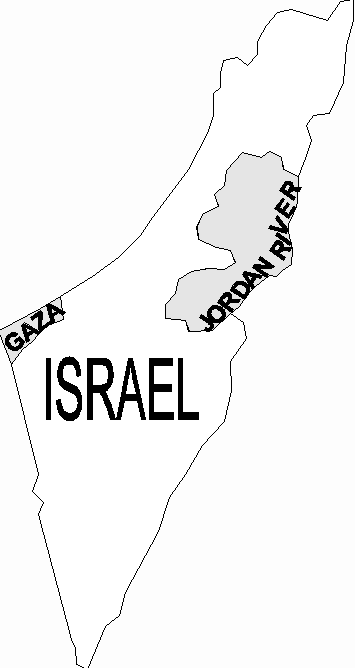 The
Jews faced pogroms, or organized massacres, particularly in Russia and
Eastern Europe. In the late 1890s, writer Theodor Herzl formulated the
ideas of Zionism. Zionism was a political movement to return the Jewish
people to their ancient homeland to form a Jewish state. By the beginning
of World War I, 85,000 Jews had returned to the land which is Israel today.
The
Jews faced pogroms, or organized massacres, particularly in Russia and
Eastern Europe. In the late 1890s, writer Theodor Herzl formulated the
ideas of Zionism. Zionism was a political movement to return the Jewish
people to their ancient homeland to form a Jewish state. By the beginning
of World War I, 85,000 Jews had returned to the land which is Israel today.
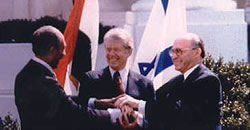 In
1977, Egyptian President Anwar Sadat took a courageous step when he became
the first Arab leader to agree to peace with Israel. Sadat met with Israeli
Prime Minister Menachem Begin at a conference organized by American President
Jimmy Carter. Carter helped Israel and Egypt negotiate a formal peace treaty
at Camp David, Maryland on March 26, 1979, ending more than thirty years
of war. Israel agreed to return land claimed in war to Egypt, and Egypt
agreed to respect Israel’s borders. Two years after signing the peace treaty
with Israel, Sadat was murdered by a fellow Egyptian who did not want peace
with Israel.
In
1977, Egyptian President Anwar Sadat took a courageous step when he became
the first Arab leader to agree to peace with Israel. Sadat met with Israeli
Prime Minister Menachem Begin at a conference organized by American President
Jimmy Carter. Carter helped Israel and Egypt negotiate a formal peace treaty
at Camp David, Maryland on March 26, 1979, ending more than thirty years
of war. Israel agreed to return land claimed in war to Egypt, and Egypt
agreed to respect Israel’s borders. Two years after signing the peace treaty
with Israel, Sadat was murdered by a fellow Egyptian who did not want peace
with Israel.
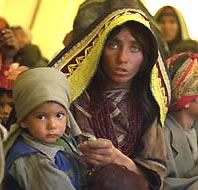 Afghanistan
is a poor, mountainous, landlocked nation in Central Asia. Many armies
have invaded Afghanistan, but no army has ever been able to survive the
rugged land or dominate the fierce, proud Afghan people for a significant
period.
Afghanistan
is a poor, mountainous, landlocked nation in Central Asia. Many armies
have invaded Afghanistan, but no army has ever been able to survive the
rugged land or dominate the fierce, proud Afghan people for a significant
period.
 The
withdrawal of Soviet troops led to a civil war in Afghanistan. A civil
war is a war within a nation. Several competing interests fought for control
of Afghanistan after the Soviets withdrew their troops. A group of fundamentalist
Islamic militants known as the Taliban became popular with many Afghan
people. Taliban is an Arabic word that means "students." Many Afghan people
initially supported the Taliban because they hoped a return to the traditional
customs of their ancient land would erase the unhappiness of the civil
war.
The
withdrawal of Soviet troops led to a civil war in Afghanistan. A civil
war is a war within a nation. Several competing interests fought for control
of Afghanistan after the Soviets withdrew their troops. A group of fundamentalist
Islamic militants known as the Taliban became popular with many Afghan
people. Taliban is an Arabic word that means "students." Many Afghan people
initially supported the Taliban because they hoped a return to the traditional
customs of their ancient land would erase the unhappiness of the civil
war.
 Since
the attacks on New York and Washington on September 11, 2001, many Americans
are confused. Why would anyone hate us? The answer may lie in part with
how America is perceived in many parts of the world.
Since
the attacks on New York and Washington on September 11, 2001, many Americans
are confused. Why would anyone hate us? The answer may lie in part with
how America is perceived in many parts of the world.